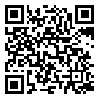Volume 11, Issue 6 (Nov & Dec 2021)
J Research Health 2021, 11(6): 435-442 |
Back to browse issues page
1- Department of Anatomy, Faculty of Medicine, Mashhad Branch, Islamic Azad University, Mashhad, Iran.
2- Department of Health and Community Medicine, Faculty of Medicine, Mashhad Branch, Islamic Azad University, Mashhad, Iran. ,dr.mostafavian@mshdiau.ac.ir
3- Department of Pediatric Cardiology, Faculty of Medicine, Mashhad Branch, Islamic Azad University, Mashhad, Iran.
4- Department of Health and Community Medicine, Faculty of Medicine, Mashhad Branch, Islamic Azad University, Mashhad, Iran.
2- Department of Health and Community Medicine, Faculty of Medicine, Mashhad Branch, Islamic Azad University, Mashhad, Iran. ,
3- Department of Pediatric Cardiology, Faculty of Medicine, Mashhad Branch, Islamic Azad University, Mashhad, Iran.
4- Department of Health and Community Medicine, Faculty of Medicine, Mashhad Branch, Islamic Azad University, Mashhad, Iran.
Abstract: (2225 Views)
Background: Infertility is one of the important concerns for couples. Men have rarely been the focus of research, and their knowledge and attitude have been less studied so far. This study investigated health literacy and attitude in men with infertility.
Methods: In this descriptive-analytic cross-sectional study, 196 men referred to one infertility center in Mashhad City, Iran, in 2019 were selected by a convenience sampling method. The study data were collected using a 20-item health literacy questionnaire and 5 attitude items towards infertility.
The relationships between age, education, occupation, income, duration of infertility, Assisted Reproductive Technologies (ART), history with reproductive health literacy, and attitude were investigated with t test, ANOVA, and linear regression in SPSS v. 20 software at a significance level of less than 0.05.
Results: The Mean±SD age of men was 35.02±6.06 years. Their Mean±SD reproductive health literacy score (3.2±0.3) did not show significant relationships with age (P=0.336), education (P=0.33), job (P=0.493), income (P=0.856), infertility duration (P=0.136), and history of ART (P=0.057). All attitude questions were not related to the education and history of ART. Attitude about surrogacy (P=0.011) and the possibility of separation of each couple in case of infertility (P=0.001) (P=0.015) for men and women respectively were different according to age. Most participants chose the answer “I don’t know” in the reproductive health literacy questionnaire.
Conclusion: Because of insufficient health literacy of men about infertility, educational planning in this area seems essential.
Methods: In this descriptive-analytic cross-sectional study, 196 men referred to one infertility center in Mashhad City, Iran, in 2019 were selected by a convenience sampling method. The study data were collected using a 20-item health literacy questionnaire and 5 attitude items towards infertility.
The relationships between age, education, occupation, income, duration of infertility, Assisted Reproductive Technologies (ART), history with reproductive health literacy, and attitude were investigated with t test, ANOVA, and linear regression in SPSS v. 20 software at a significance level of less than 0.05.
Results: The Mean±SD age of men was 35.02±6.06 years. Their Mean±SD reproductive health literacy score (3.2±0.3) did not show significant relationships with age (P=0.336), education (P=0.33), job (P=0.493), income (P=0.856), infertility duration (P=0.136), and history of ART (P=0.057). All attitude questions were not related to the education and history of ART. Attitude about surrogacy (P=0.011) and the possibility of separation of each couple in case of infertility (P=0.001) (P=0.015) for men and women respectively were different according to age. Most participants chose the answer “I don’t know” in the reproductive health literacy questionnaire.
Conclusion: Because of insufficient health literacy of men about infertility, educational planning in this area seems essential.
Type of Study: Short Communication |
Received: 2020/11/12 | Accepted: 2021/02/17 | Published: 2021/12/1
Received: 2020/11/12 | Accepted: 2021/02/17 | Published: 2021/12/1
| Rights and permissions | |
 |
This work is licensed under a Creative Commons Attribution-NonCommercial 4.0 International License. |





